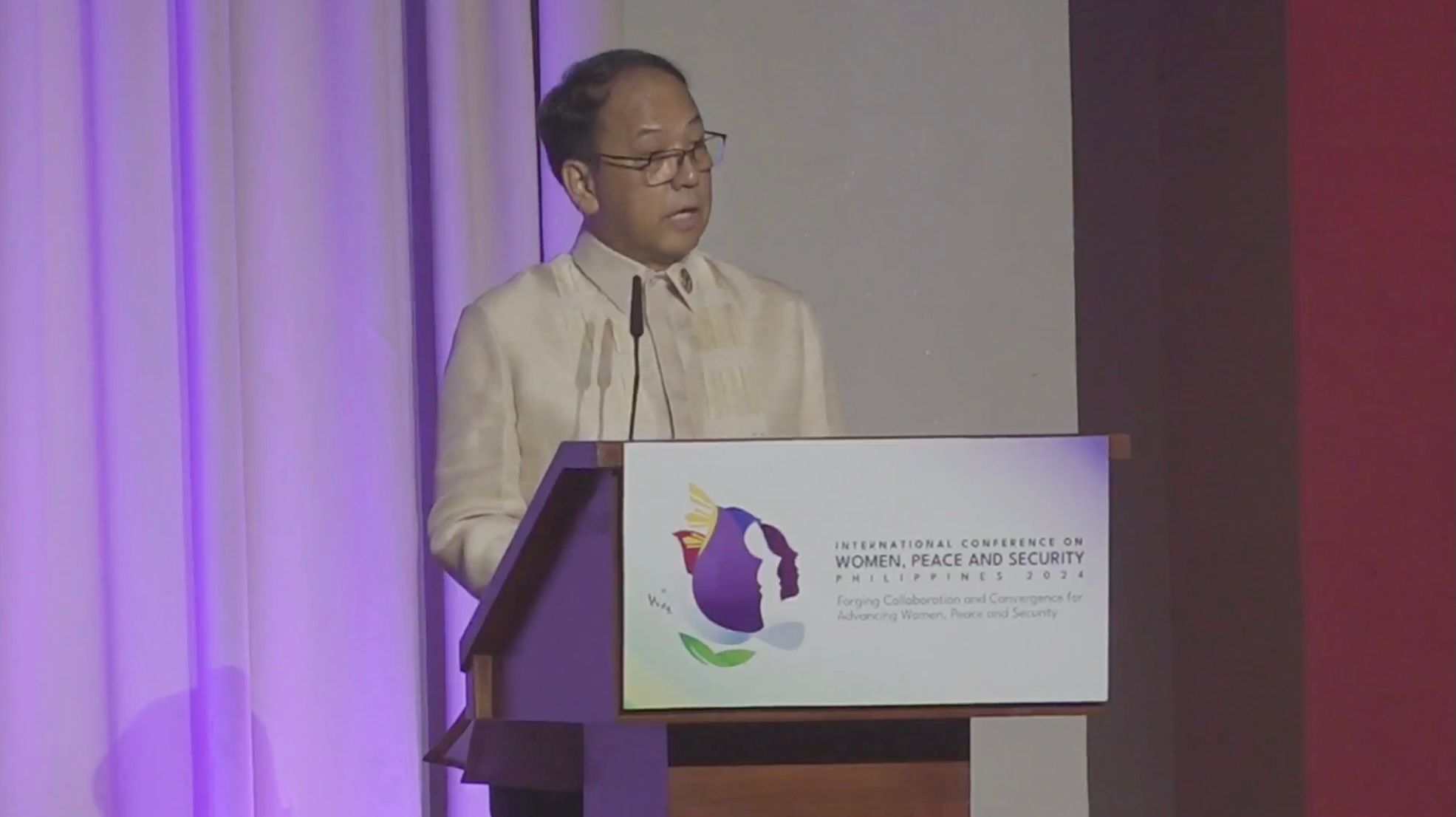PH hosts international conference on women, peace, security
Pasay Declaration to be adopted; Center for Excellence on WPS to be created

The Philippine government opened the International Conference on Women, Peace and Security (ICWPS) 2024 at the Philippine International Convention Center (PICC) in Pasay City on Monday, Oct. 28, to assess progress on the Women, Peace and Security (WPS) Agenda and explore ways to strengthen the women’s role in peace-building.
The top-level meet gathered 691 delegates, 27 ministerial levels and parliamentarians from 84 countries across six regions. The three-day conference being held until Oct. 30 carries the theme, “Forging collaboration and Convergence for Advancing Women, Peace and Security.”
Office of the Presidential Adviser on Peace, Reconciliation and Unity (OPAPRU) Secretary Carlito Galvez Jr. said in his keynote address that education and women empowerment “have been the bedrock of our nation’s march towards sustainable development and long-lasting peace.”
“This is the very reason why we are gathered here today — to advance gender equality and women empowerment in the areas of peace and security,” he said.
These principles, according to Galvez, are articulated in the United Nations Security Council Resolution 1325 which reaffirms the significant role of women in conflict prevention and resolution, peacebuilding, peacekeeping, humanitarian response, and in post-conflict reconstruction.
Among the highlights of the conference is the adoption of the Pasay Declaration which seeks to reinvigorate the global efforts for forging collaboration and convergence to push for meaningful and substantive participation of women in all their diverse and intersecting identities in all facets of peace processes. It also aims to guarantee women and girls’ protection before, during, and after conflict situations.
Further, Galvez said that the conference will also feature a ceremonial signing for the creation of the Philippines’ Center of Excellence on Women, Peace and Security. The Center of Excellence, only the third to be established in the world, will be built in partnership with the US State Department.
“Once established, this center will be among the major achievements of the Marcos Jr. administration, which has expressed its unwavering support and steadfast commitment to the comprehensive Philippine peace process,” he noted.
Last year, over 170 conflicts were recorded around the world which impacted 612 million women and girls, and was a staggering 50-percent increase from only a decade ago, according to UN Deputy Secretary-General Amina J. Mohammed.
“The implications are dire: the proportion of women killed in armed conflicts has doubled, conflict-related sexual violence has risen by 50 percent, and the number of women and girls that are forcibly displaced due to persecution, conflict and violence has surged by 70 percent since 2018,” she said.
Despite this, she said the role of women and girls in preserving and promoting peace are often underrepresented from the picture, thus, a need for a collective effort to involve women and girls meaningfully in decision-making and consider their needs when it comes to matters of peace and security.
To date, Galvez acknowledged that 107 countries have adopted National Action Plans (NAPs) on Women, Peace and Security (WPS) including 12 nations in the Asia-Pacific region.
Several countries are developing their first NAP on WPS while others are developing their second or third. ASEAN or the Association of Southeast Asian Nations has recently developed a regional plan of action on WPS.
The Philippines, for its part, is the first Asian country to adopt a NAP WPS in 2010, and is one of the only five countries among the 108 United Nations (UN) member-states to craft and implement the plan’s fourth iteration.
The plan emphasizes a conflict-sensitive, peace-promoting, whole-of-society and empowering approach that is geared toward peace enforcement, peacemaking, and peace-building concepts. This includes a wide range of initiatives that will be implemented to address the root causes of armed conflict and prevent its resurgence.
Currently, the fourth generation action plan signifies a progressive evolution in the Philippines’ approach to addressing challenges faced by women in conflict situations and highlights their contributions to peace-building efforts.
The Philippines is also one of the few examples worldwide where a peace agreement was led by a woman. Miriam Coronel Ferrer is a peace advocate who became the first woman who signed a major peace deal that was recognized across the globe.
In 2014, Ferrer signed the Comprehensive Agreement on the Bangsamoro (CAB) as the Philippine government (GPH) chief negotiator in the GPH-Moro Islamic Liberation Front (MILF) negotiation.
The signing of the CAB, the final peace agreement between the GPH and MILF, paved the way for the creation of the Bangsamoro Autonomous Region in Muslim Mindanao (BARMM). Currently it remains as the only major peace accord signed by a woman chief negotiator.
Galvez thanked the participants who attended the conference as he hoped that they would be able to “build meaningful partnerships and gain invaluable lessons that we can take back to our respective communities and countries.”
“May we unite and work together to capacitate, strengthen and empower women not only in our own countries but all over the world,” the peace adviser said.